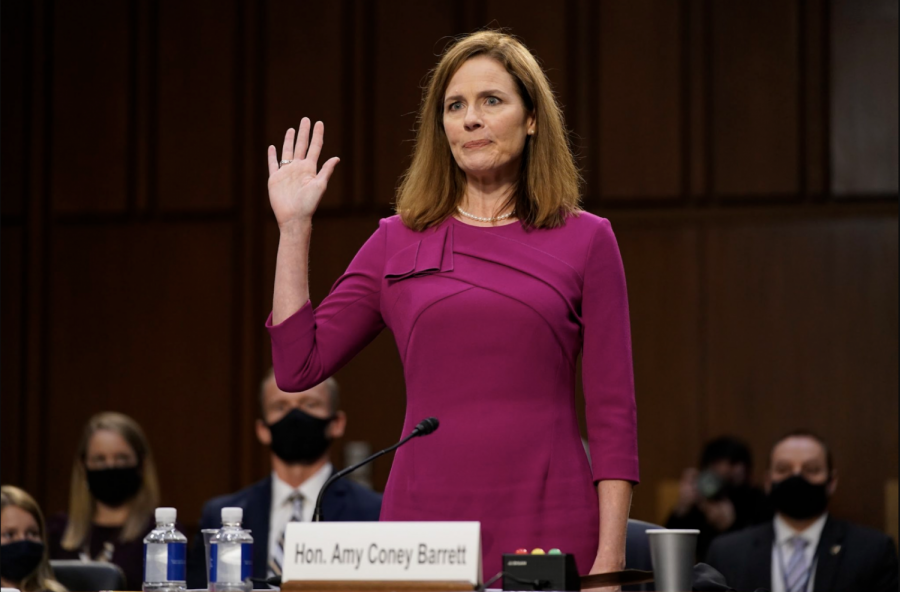Justice Amy Coney Barrett poses a risk to LGBTQ+ Americans
Amy Coney Barrett
On Oct. 26, the United States Senate confirmed former Federal Circuit Judge Amy Coney Barrett to the Supreme Court by a vote of 52-48. I, among several others, thought that rushing a confirmation with only a few weeks left until the election was unjust, especially considering the vast amount of people—over four million on Oct. 21, according to Pew Research—who had already sent their votes in by mail. Essentially, Donald Trump appointed a justice to the Supreme Court—a lifelong position—during a time when there was no clear consensus on whether the American people wanted his continued service as president.
Barrett will be succeeding late liberal icon Justice Ruth Bader-Ginsburg, who served on the Supreme Court for 27 years. All over social media, people mourned the fact that doors opened by the “notorious RBG” were now at risk to be shut by the new justice.
Barrett is a Constitutional Originalist, meaning that she interprets the Constitution as only what it meant 200 years ago and does not speculate about its modern-day interpretations or view it as a living document. This in itself I find problematic. It is 2020, and society has changed too much for us to draw a reasonable conclusion on what the founding fathers would think of cyberbullying, net neutrality and Affirmative Action.
Watching Barrett’s confirmation hearing has brought forth several concerns. For starters, seeing the future Supreme Court judge struggle to name the five freedoms guaranteed in the First Amendment, something most American children ages eight to 18 are able to do, was painful. How can we expect a justice to uphold our constitutional rights if she can’t be bothered to remember them?
But what disturbs me most are Amy Coney Barrett’s opinions regarding LGBTQ+ protections, as she struggles to respect the identities and rights of the community.
For one, at a Jacksonville University Hesburgh lecture in 2016, when Barrett was a professor, she did not refer to transgender people by their identified genders, instead calling women “physiological males.” It is widely accepted now, as it was in 2016, that calling a transgender woman a woman, a transgender man a man, and a non-binary person by their preferred pronouns is easily more respectful than calling them “physiologically male” or female.
In the same lecture, Barrett discussed Title IX, which states that “No person in the United States shall, on the basis of sex, be excluded from participation in, be denied the benefits of, or be subjected to discrimination under any education program or activity receiving Federal financial assistance.”
In her lecture, Barrett asserted that protecting transgender people is a stretch of Title IX. Barrett would disagree, but I find that a student being excluded from using a public restroom because they were not born in a body that reflects their gender identity is a textbook example of exclusion based on sex. When Title IX talks about sex, it means sex in the sense of gender, or the sex that one is interpreted to be by the people around them. Barrett’s arguments against Title IX’s protection of transgender Americans raises concerns about the validity she assigns to LGBTQ+ people.
Another issue to address is Amy Coney Barret’s affiliation with Alliance Defending Freedom (ADF), a conservative Christian law firm with a very anti-LGBTQ+ history. ADF has been involved in and even written anti-transgender bathroom bills for multiple states. The Christian law firm contends that allowing gay marriage “remov(es) the foundation of civilization (and) redesign(s) society at the cost of your religious freedom.”
Barret called her experience giving paid lectures for the Alliance Defending Freedom “a wonderful one.”
At her confirmation hearings, Barrett said that she was “not aware” of ADF’s efforts to recriminalize gay marriage. I find that very hard to believe—within two minutes of being on ADF’s website, I had more than enough evidence to conclude that the organization is anything but accepting, or even tolerating, of LGBTQ+ people. The core values of the Alliance Defending Freedom include the outlawing of gay marriage and even intimate same-sex relationships—as seen in ADF’s briefs in Lawrence v. Texas, according to NBC—all in the name of religious freedom.
I believe it fair to say that Amy Coney Barrett does not appear to be a friend of the LGBTQ+ community. That isn’t okay, necessarily, but it is understandable. Americans have a right to opinions and political leanings, including justices. The role of a justice is to remain unbiased in court decisions and to refer to the Constitution and not to personal moral values.
However, with her track record and Constitutional Originalist views, I fear for the future of LGBTQ+ Americans and for all of the progress we have made up to this point. This sense of dread is especially palpable with the Fulton v. City of Philadelphia decision coming up, which will decide whether child welfare agencies can refuse to work with same-sex couples on the basis of religious beliefs. I think it is unreasonable to believe that Barrett, who has only been a judge for three years, will keep her opinions on the rights of fellow Americans separate from her court rulings.











